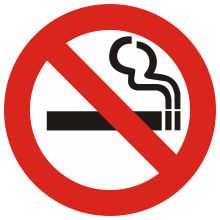User:Buginblue/Smoking cessation

Smoking cessation (commonly known as quitting, or kicking the habit) is the effort to stop smoking tobacco products. Nicotine is a potentially addictive substance, especially when taken in by inhaling tobacco smoke, probably because of the rapid absorption through the lungs. Tobacco use is one of the major causes of death worldwide, according to the World Health Organization.[1].
Research in western countries has found that approximately 3-5% of quit attempts succeed using willpower alone (Hughes et al, 2004) and clinical trials have shown that Nicotine Replacement Therapy (NRT) (see below) can double this rate to approximately 6-10% (Silagy et al, 2004). This is a small effect but very worthwhile. Multi-session psychological support from a trained counsellor, either individually or in groups has been shown in clinical trials to have an effect similar to that for NRT. The best chances of success can be obtained by combining medication and psychyological support (see below) (USDHHS, 2000). Apart from NRT, medication that have been shown to be effective in clinical trials are: the tricylcic anti-depressant nortriptyline, bupropion (Zyban) and the nicotinic partial agonist, varenicline (Chantix in the US and Champix elsewhere). Thorough reviews of the evidence for all these methods of stopping are available via the Cochrane Library website Cochrane Library
There are many people and organisations touting what are claimed to be effective methods of helping smokers to stop. Any smoker thinking of paying money for such help would be well advised to ask whether the claims of success are backed up by indepedent comparative clinical trials, how the success rates have been calculated and what numbers of smokers have been included in the figures. It is very easy to make misleading claims of success rates which are not adequately supported by evidence.
A range of population level strategies such as advertising campaigns, smoking restriction policies, and tobacco taxes have been used to promote smoking cessation. Of these, raising the cost of smoking is the one that has the strongest evidence (West, 2006).
Smoking cessation will almost always lead to a longer and healthier life. Stopping in early adulthood can add up to 10 years of healthy life and stopping in one's 60s can still add 3 years of healthy life (Doll et al, 2004). Stopping smoking is also associated with better mental health and spending less of one's life with diseases of old age.
The most common short-term effects of stopping smoking are: increased irritability, depression, anxiety, restlessness, difficulty concentrating, increased appetite, constipation, mouth ulcers and increased susceptibility to upper respiratory tract infections. These mostly last for up to 4 weeks, though increased appetite typically lasts for more than 3 months. The most obvious long-term effect is weight gain (Hughes, 2007).
References[edit]
- Doll R, Peto R, Boreham J, Sutherland I. Mortality in relation to smoking: 50 years' observations on male British doctors. Bmj 2004;328(7455):1519.
- Hughes JR. Effects of abstinence from tobacco: valid symptoms and time course. Nicotine Tob Res 2007;9(3):315-27.
- Hughes JR, Keely J, Naud S. Shape of the relapse curve and long-term abstinence among untreated smokers. Addiction 2004;99(1):29-38.
- Silagy C, Lancaster T, Stead L, Mant D, Fowler G. Nicotine replacement therapy for smoking cessation. Cochrane Database Syst Rev 2004(3):CD000146.
- USDHHS. Treating Tobacco Use and Dependence. Rockville, MD: Agency for Healthcare Research Quality; 2000.
- West R. Tobacco control: present and future. Br Med Bull 2006;77-78:123-36.
